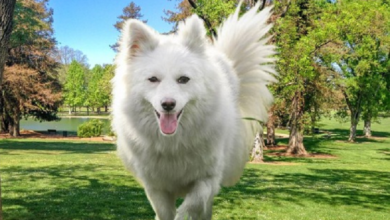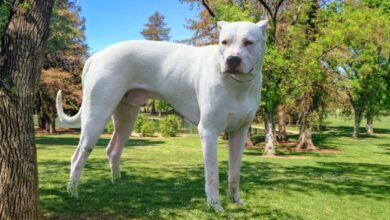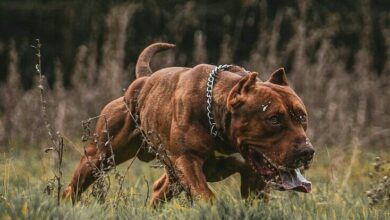Pug Dog Breed Information: Price, Lifespan, Appearance & Characteristics

Pug Dog Breed Overview
Pug Dog is a Greek pug that has a wrinkly, very expressive face with a distinctive black mask. The breed was originated in China and later known as the “Peking” Dog. The breed was first introduced to England in the 17th century. This is a famous breed of dog and it is often seen in human illustrative art. The pug is a toy-like dog a wrinkly and friendly one.
Pug Dog Breed Profile At a Glance
| Dog Breed Name | Pug |
| Size | Small |
| Average Height | 10 to 13 inches |
| Average Weight | 14 – 18 Pounds |
| Energy | Active |
| Activity | Agility, Obedience, Rally Obedience |
| Origin | China |
| Group | Toy |
| Life Span* | 12 – 15 years |
| Biography | The pug is a breed of dog originally from China, with physically distinctive features of a wrinkly, short-muzzled face and curled tail. The breed has a fine, glossy coat that comes in a variety of colours. |
| Coat | Short |
| Colour | Black, Fawn, Silver Fawn |
| Temperament | friendly, Charming, Clever, Playful, Mischievous, Loving, Quiet, Calm |
| Pros | Pugs are little in size, making them reasonable for small-sized rooms. |
| Friendly in Nature | |
| Pugs are low to medium-shed varieties | |
| Cons | Gains weight easily |
| Pugs are inclined to different throats, ears, eyes and breathing inconveniences; subsequently, they will require regular health check-ups. | |
| Not too suitable as a guard dog. |
Characteristics
Pugs are one of the most adorable breeds of dogs. They were bred to be lap dogs and they are known for their lovable, playful personalities. Pugs are not recommended for people with allergies or who want a guard dog. The Pug is not an aggressive breed and will generally get along well with other animals in the house, but they can be difficult to train because they have an independent streak.
Pug Dog Price
The Pug puppy price would range from $800 to $1,500 (Estimated).
Pug Dog Breed Appearance:
Size
They are small in size, Males: 14-18 lbs.; Females: 14-18 lbs
Weight
Their standard Weight starts from Male: 7.6kg to 10kg, Female: 7.6kg to 10kg.
Colour
They are found in Various combinations like Black, Fawn, Silver Fawn
Coat
Their coat is Short.
Top Activities of Pugs
Pug’s top activities are understanding training quickly, fun tricks, playing puzzles, Dock-diving etc.
How long does a Pug live?
Their average life span is 12 – 15 years
Pug Dog Temperament
The temperament of Pug dogs is stable temperament, with great charm, and an outgoing, loving disposition.
Interesting Facts about Pug Dog
- The pug is one of the oldest breeds, with references dating back to 400 B.C
- Pugs are the best and they are friendly and playful.
- Pugs are great for kids.
- Pugs are mischievous and stubborn.
- Pugs can be very expensive and they can cost up to $2000
Most Frequent Asked Questions about Pug Dog
1. What makes pugs happy?
Pugs are very happy when they are with their owners. They love to play and explore, but they really enjoy snuggling up with their owner on the couch or bed.
2. Is the Pug hypoallergenic?
Pugs are not typically considered to be hypoallergenic because they shed all year round and produce dander, which can cause allergic reactions in people with sensitive skin.
3. Do pugs bark a lot?
The answer is yes! Pugs are known to bark a lot. They have a very deep voice and they use it often.
4. What do pugs love most?
Pugs love to be with their humans. They also enjoy playing with other dogs and will do best in homes that have other dogs for them to play with. Pugs have a lot of energy and need to be taken on long walks or runs every day. They also enjoy playing in water and will jump in puddles or play with sprinklers if given the chance.
5. What is poisonous to pugs?
Pugs are prone to certain diseases or conditions that may be caused by their diet, such as Pug Dog Encephalitis. They should avoid foods and substances that contain caffeine, onions, grapes, raisins, alcohol, chocolate and anything containing xylitol.





